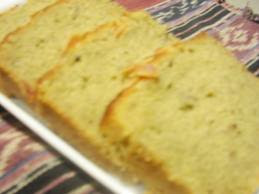NAMA : FILIN ANGGRAINI
KELAS : 4EA15
NPM : 10209576
DOSEN : NONI
MARLIANINGSIH
Black
Bean Brownies (Low-Carb, Low GI, Gluten Free)
Ingredients:
1 (15 ounce) can black beans, drained & rinsed
1/3 cup agave nectar
1/3 cup cocoa powder (unsweetened)
1 teaspoon vanilla extract
2 tablespoons canola oil
1/2 teaspoon instant coffee granules
1 teaspoon baking powder
1 large egg
2 tablespoons mini chocolate chips
1/4 cup chopped walnuts
Directions:
1 Preheat oven to 350 degrees, and grease a 12-cup muffin tin.
2 Combine the first seven ingredients (beans through baking powder) in a blender or food processor until smooth.
3 Stir in the egg, chocolate chips, and walnuts (if desired).
4 Pour into muffin tin, bake at 350 for 20 minutes.
5 Cool for 10 minutes before serving.
6 to make Vegan brownies, replace the egg with a flax egg, and chocolate chips with Vegan chocolate chips.
1 (15 ounce) can black beans, drained & rinsed
1/3 cup agave nectar
1/3 cup cocoa powder (unsweetened)
1 teaspoon vanilla extract
2 tablespoons canola oil
1/2 teaspoon instant coffee granules
1 teaspoon baking powder
1 large egg
2 tablespoons mini chocolate chips
1/4 cup chopped walnuts
Directions:
1 Preheat oven to 350 degrees, and grease a 12-cup muffin tin.
2 Combine the first seven ingredients (beans through baking powder) in a blender or food processor until smooth.
3 Stir in the egg, chocolate chips, and walnuts (if desired).
4 Pour into muffin tin, bake at 350 for 20 minutes.
5 Cool for 10 minutes before serving.
6 to make Vegan brownies, replace the egg with a flax egg, and chocolate chips with Vegan chocolate chips.
Refrensi : http://allrecipes.com/recipe/best-brownies/
Easy banana cake
Ingredients
Serves : 10
- 125g butter
- 150g caster sugar
- 1 tsp vanilla extract
- 1 egg, beaten
- 2 very ripe bananas, mashed
- 190g self raising flour
- 60ml milk
Directions
Prep:10min › Cook:35min › Ready in:45min
- Grease and line a 2lb loaf tin. Melt butter, sugar and vanilla in a saucepan over a medium heat.
- Remove from heat and add the mashed bananas, mix well.
- Add the egg, mix well.
- Stir in the flour and the milk.
- Pour into the prepared tin, sprinkle with a tablespoon of demerara sugar to give a crunch topping if liked.
- Bake at 150 C fan oven (or 170 C regular, Gas mark 3) for 35 mins, until a skewer comes out clean. Leave to cool and enjoy!
Editor's note
This recipe has been edited by Allrecipes staff to include measurements familiar to UK and Irish cooks.Simply Delicious Strawberry Cake
Total Time: 45 min
Prep 15 min
Inactive 10 min
Cook 20 min
Yield: 8 servings
Level: Easy
Prep 15 min
Inactive 10 min
Cook 20 min
Yield: 8 servings
Level: Easy
Ingredients
1 (18.25-ounce) box white cake mix
1 (3-ounce) box strawberry-flavored instant gelatin
1 (15-ounce) package frozen strawberries in syrup, thawed and pureed
4 large eggs
1/2 cup vegetable oil
1/4 cup water
Strawberry cream cheese frosting, recipe follows
Strawberry Cream Cheese Frosting
1/4 cup butter, softened
1 (8-ounce) package cream cheese, softened
1 (10-ounce) package frozen strawberries in syrup, thawed and pureed
1/2 teaspoon strawberry extract
7 cups confectioners' sugar
Freshly sliced strawberries, for garnish, optional
Directions
Preheat oven to 350 degrees F. Lightly grease 2 (9-inch) round cake pans.
In a large bowl, combine cake mix and gelatin. Add pureed strawberries, eggs, oil, and water; beat at medium speed with an electric mixer until smooth. Pour into prepared pans, and bake for 20 minutes, or until a wooden pick inserted in the center comes out clean.
Let cool in pans for 10 minutes. Remove from pans, and cool completely on wire racks.
For the frosting:
In a large bowl, beat butter and cream cheese at medium speed with an electric mixer until creamy. Beat in 1/4 cup of the strawberry puree and the strawberry extract. (The rest of the puree is leftover but can be used in smoothies or on ice cream for a delicious treat.) Gradually add confectioners' sugar, beating until smooth.
Spread frosting in between layers and on top and sides of cake. Garnish with sliced fresh strawberries, if desired.
Refrensi : http://www.foodnetwork.com/recipes/paula-deen/simply-delicious-strawberry-cake-recipe/index.html
1 (18.25-ounce) box white cake mix
1 (3-ounce) box strawberry-flavored instant gelatin
1 (15-ounce) package frozen strawberries in syrup, thawed and pureed
4 large eggs
1/2 cup vegetable oil
1/4 cup water
Strawberry cream cheese frosting, recipe follows
Strawberry Cream Cheese Frosting
1/4 cup butter, softened
1 (8-ounce) package cream cheese, softened
1 (10-ounce) package frozen strawberries in syrup, thawed and pureed
1/2 teaspoon strawberry extract
7 cups confectioners' sugar
Freshly sliced strawberries, for garnish, optional
Directions
Preheat oven to 350 degrees F. Lightly grease 2 (9-inch) round cake pans.
In a large bowl, combine cake mix and gelatin. Add pureed strawberries, eggs, oil, and water; beat at medium speed with an electric mixer until smooth. Pour into prepared pans, and bake for 20 minutes, or until a wooden pick inserted in the center comes out clean.
Let cool in pans for 10 minutes. Remove from pans, and cool completely on wire racks.
For the frosting:
In a large bowl, beat butter and cream cheese at medium speed with an electric mixer until creamy. Beat in 1/4 cup of the strawberry puree and the strawberry extract. (The rest of the puree is leftover but can be used in smoothies or on ice cream for a delicious treat.) Gradually add confectioners' sugar, beating until smooth.
Spread frosting in between layers and on top and sides of cake. Garnish with sliced fresh strawberries, if desired.
Refrensi : http://www.foodnetwork.com/recipes/paula-deen/simply-delicious-strawberry-cake-recipe/index.html


